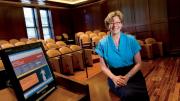Students seeking rigorous training in large-scale computation and advanced mathematical modeling can apply this fall for a new master of science (S.M.) in computational science and engineering (CSE) degree at the Graduate School of Arts and Sciences (GSAS), University officials have announced.
Jointly managed by GSAS and the School of Engineering and Applied Sciences (SEAS), the one-year program will offer a broader curriculum than is typical for master’s degrees in computational science, focusing on mathematical techniques for modeling and simulation of complex systems; parallel programming and collaborative software development; and efficient methods for organizing, exploring, visualizing, processing, and analyzing very large data sets.
The new program grew out of Harvard’s recently created Institute for Applied Computational Science (IACS)—an initiative charged with launching interdisciplinary education and enhancing existing programs in computational science and engineering in SEAS—and partnerships with leaders in national labs like Microsoft Research New England, as well as with faculty members across the University. (In 2011, IACS launched a graduate minor program in computational science and engineering available to students currently enrolled in a Ph.D. program in GSAS.)
“It is essential that we provide the next generation of leaders with the heavy-duty computational skills to analyze real, complex systems,” says SEAS dean Cherry A. Murray. “We want to equip our students with the confidence to dive into fundamental problems like medicine, climate modeling, and operational logistics, and with the skills to reshape the world for the better.”
Specifically, each student's plan of study for the degree will include:
- at least three of the four core courses, including one or two from both the Applied Mathematics (AM) core and and the Computer Science (CS) core
- between two and six CSE electives chosen from a suggested list, including at least one from the AM list and one in CS
- up to two “domain electives”—approved computation-intensive courses within a domain
- up to two semester-length independent research projects
- as a final requirement, an oral examination by a faculty committee
In accord with the University’s commitment to interdisciplinary learning, master’s students will interact with faculty from a variety of disciplines, including the natural and social sciences, humanities, and engineering, with the aim of creating a degree program that is “both intellectually rich and scientifically vital,” according to Murray. Beginning in 2014, SEAS will also offer a two-year master of engineering (M.E.) program, with a second year devoted mainly to research.
“Many of the defining questions of this era in science and technology will be centered on ‘big data’ and machine learning,” says advisory board member Jennifer Chayes, managing director of Microsoft Research in New England and New York City. “This master’s program will prepare students to answer those questions by integrating and applying computation and engineering with other disciplines, including both physical and social sciences.”








